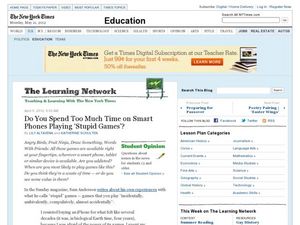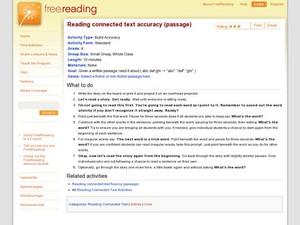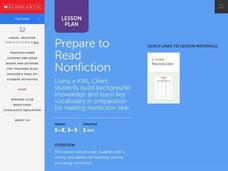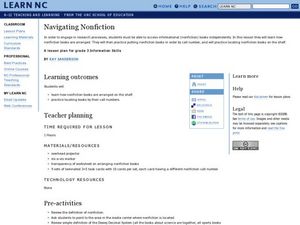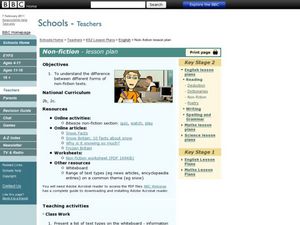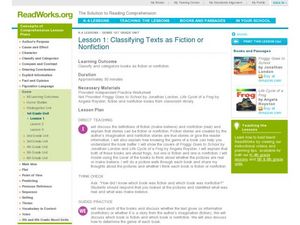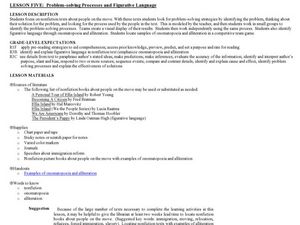Curated OER
Student Opinion: Do You Spend Too Much Time on Smart Phones Playing 'Stupid Games'?
This versatile resource from The New York Times website provides a short opinion piece on smart phones and the amount of time we spend playing games on them as well as several possible writing prompts pupils could consider in response to...
Curated OER
Student Opinion: How Impulsive Are You?
Sure to spark lively discussion in any Language Arts classroom, this article from The York Times asks the question, 'How much self-control do you have?'. Pupils begin by reading a short passage about a study on delayed gratification and...
Curated OER
The Learning Network: Poetry Pairing July, 21, 2011
Although not a complete lesson plan, this set of emotionally powerful texts could be used in a variety of lessons. From The New York Times' Learning Network site, the resource includes a poem, an excerpt from a New York Times article and...
Curated OER
Reading Questions: Alex Haley's "My Furthest Back Person: The African"
Based on Alex Haley's moving essay "My Furthest Back Person: The African," these 11 questions support comprehension and prepare readers for discussion of the text. Use this tool, and the essay, as a nonfiction addition to units on...
Curated OER
Reading Connected Text Accuracy (Passage)
Use some of these 80-word passages to practice reading fluency with your beginners. Project the text so all learners can see it, pointing to each word as scholars recite them one at a time. Warn readers of irregularly spelled words by...
Curated OER
Introduce Vocabulary: Clouds (Bauer)
What type of cloud is that? Explore meteorological vocabulary using Marion Bauer's book, Clouds (although these strategies could be used for any fiction or nonfiction text). Pre-teach the new words before reading the story aloud....
Curated OER
Introduce Vocabulary: Cross a Bridge (Hunter)
What does suspension mean? Learn this and other bridge-related vocabulary as scholars listen to Ryan Ann Hunter's nonfiction book, Cross a Bridge. This strategy can be applied to any book. Before reading, acquaint pupils with the new...
Curated OER
Introduce Vocabulary: Firefighters (Mitten)
Your budding readers know what it's like to get to a word and think, "What does that mean?" Expand their vocabulary in context using Christopher Mitten's nonfiction picture book Firefighters. Get them ready by pre-teaching the new words...
Curated OER
Genre Lesson: Autobiography
Start kids thinking about point of view and autobiographies by telling them a short story about your morning (first person), and then asking a volunteer to re-tell the story to you (second person). There are tips to help you tie this...
Curated OER
Using Details from Nonfiction Text to Organize Sequence of Events
Is it important to do things in a certain order? Yes, especially when making a peanut butter and jelly sandwich. Or so your class will learn in a lesson on sequencing. After guided practice, class members generate their own “how-to”...
Curated OER
Prepare to Read Nonfiction
Students get an introduction to using KWL Charts as tools for reading nonfiction. They study unfamiliar words and share what they already know about the topic of the non-fiction selection and use this knowledge to help prepare to read.
Scholastic
Mixed Bags: Fiction and Nonfiction
Using a bag with one fiction and non-fiction book of similar topics, partners work together to find the differences and similarities of each story. They record their obervances in a T-chart.
Pennsylvania Department of Education
Comparing Key Ideas and Details in Fiction and Nonfiction
Students recognize the differences between fiction and nonfiction texts. In this genre study lesson, students discuss what nonfiction means and write the definition. Students listen to a read aloud and vote whether the text is fiction or...
Curated OER
Nonfiction Text Features
Identify features of a nonfiction article in this language arts lesson. Middle schoolers apply comprehension strategies as they read the parts of the article, and analyze the author's key points. Additionally, they examine information in...
Curriculum Corner
I See a School
Enthusiastic readers report on a book detailing what it's about and their favorite part with a picture-based writing template. A nonfiction version takes a step further to highlight what the pupil learned, and a fiction version showcases...
Curated OER
Fiction vs. Nonfiction
Students explore fiction and nonfiction writing. They identify the elements of fiction in a short story and identify the criteria necessary in a nonfiction piece. Students distinguish the author's purpose in an expository text,...
Curated OER
Navigating Nonfiction
Third graders explore the arrangement of nonfiction. In this library skills lesson, 3rd graders examine Dewey Decimal classification as they collaborate to locate nonfiction materials in the library/media center.
Curated OER
Fiction vs. Nonfiction
Students find the difference between fiction and nonfiction. In this fiction/nonfiction instructional activity, 1st graders read the story Johnny Appleseed and discuss what makes this a nonfiction story. They listen to a fiction story...
Pennsylvania Department of Education
Analyzing Key Ideas and Details in Nonfiction
Students explore nonfiction texts. In this language arts lesson, students read a nonfiction text and make predictions. Students identify facts and opinions in the text and draw conclusions as they read.
Curated OER
Non-Fiction Texts
Third graders examine different types of non-fiction texts. In this non fiction instructional activity, 3rd graders use different types of texts to gather information. Students work in groups to analyze the texts for author's purpose,...
Curated OER
Text Elements of Fiction and Nonfiction
Second graders examine the text elements associated with fiction and nonfiction texts. In this text elements instructional activity, 2nd graders listen to Anansi and the Moss Covered Rock by Eric A. Kimmel. They take formative...
Curated OER
Lesson 1: Classifying Texts as Fiction or Nonfiction
First graders characterize fiction and non-fiction books, they discover the characteristics of each type of book and compare two books (one fiction & one nonfiction) about the same subject. They make a list that describes what makes...
Curated OER
Let's Learn Library Language
This PowerPoint presentation provides a review of 'library language', vocabulary associated with books and the library such as cover, title, author, illustrator, call number and fiction/nonfiction. Each slide of this PowerPoint displays...
Curated OER
Problem-Solving Processes and Figurative Language
Nonfiction texts about people on the move provide young readers with an opportunity to examine not only the problem-solving strategies employed by immigrants, but to also find examples of figurative language these writers use to tell...
Other popular searches
- Nonfiction Book Reports
- Nonfiction Text
- Summarizing Nonfiction
- Fiction and Nonfiction
- Fiction or Nonfiction
- Nonfiction Reading
- Nonfiction Text Features
- Nonfiction Text Structure
- Nonfiction Books
- Nonfiction Reading Skills
- Nonfiction Writing
- Nonfiction Literature


